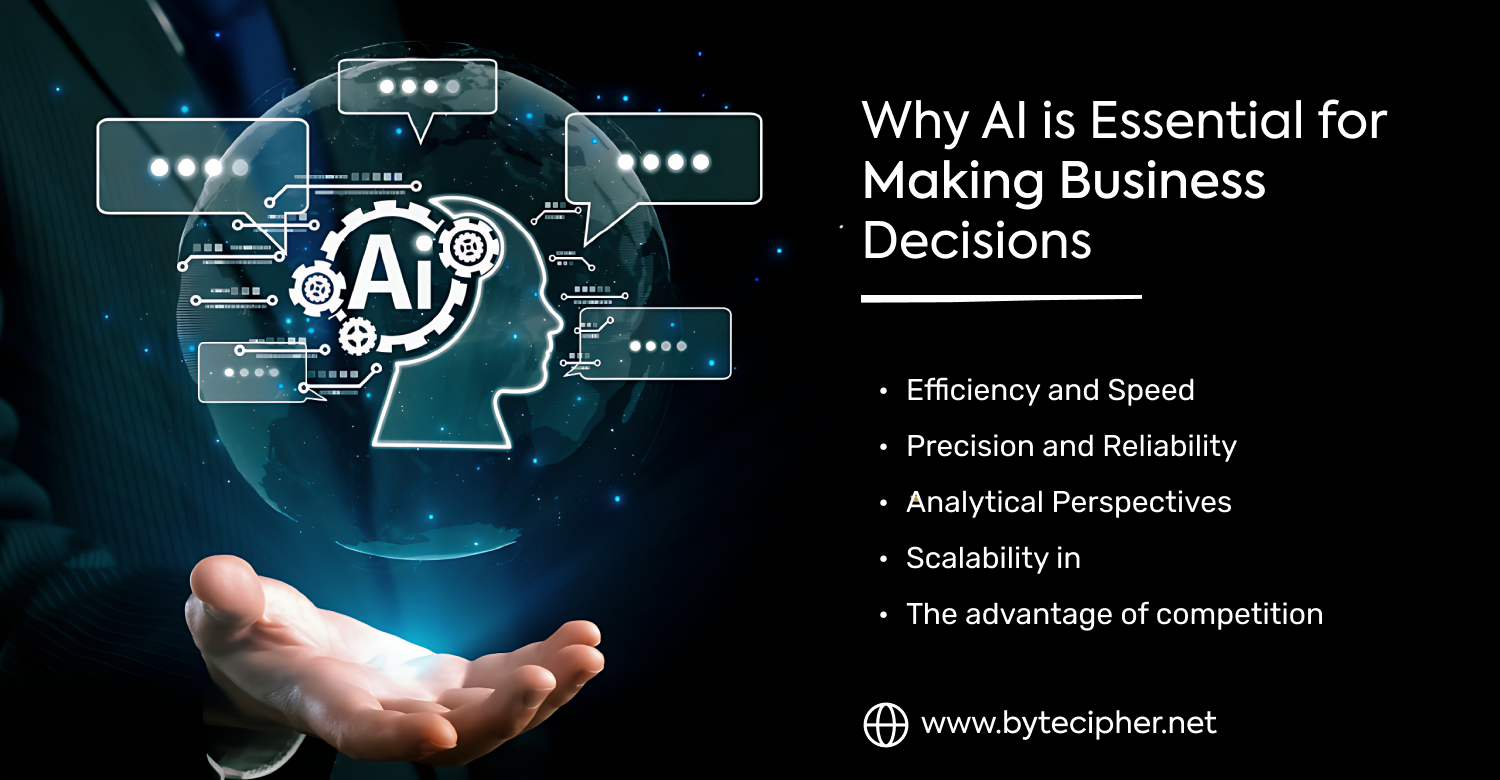
Rapid data collection has made it impossible for businesses to make judgments only on the basis of intuition. These days, Artificial Intelligence (AI) is changing how businesses make important decisions, such setting a product’s price, predicting sales, or choosing which market to enter next.
Through the use of AI-driven decision making, businesses can examine intricate data, spot trends, and produce forecasted insights—often instantly. And the outcome? better plans, lower risks, and quicker implementation.
This blog will discuss artificial intelligence (AI) decision making, including its definition, significance, practical applications, constraints, and scaling its application in your company.
Important Lessons
-
AI-driven decision making enhances how companies select courses of action and tactics by utilizing data, algorithms, and automation.
-
It produces judgments more quickly, accurately, and scalable than conventional techniques.
-
AI is already being used extensively by sectors including healthcare, retail, finance, and logistics to remain ahead of the competition.
-
Even while AI has great potential, human oversight is still crucial, particularly when making morally difficult or high-stakes judgments.
-
To grow successfully, begin with tiny AI solutions, pay attention to data quality, and match with your business objectives.
AI Decision Making: What Is IT?
The term “AI decision making” describes how automation, data analytics, and machine learning are used to inform or directly make business choices. These systems analyze large datasets, spot trends, and suggest—or execute—actions.
A few examples are:
-
AI recommending goods discounts in response to consumer demand.
-
Real-time detection of fraudulent transactions via AI-powered technologies.
-
AI predicting the most effective marketing campaign
There are generally two types of AI decision-making systems:
-
AI-powered decision support systems that provide people with advice and insights
-
Systems for decision automation in which AI decides and acts on its own

Examples of AI Decision Making in the Real World for Various Industries
Healthcare
-
AI Use: To forecast patient readmissions or the course of a disease.
-
Impact: By cutting expenses and making the most use of their resources, hospitals enhance patient care.
Wholesale & Online Sales
-
AI Use: Personalized product recommendations and dynamic pricing
-
Impact: Sellers on Shopify and Amazon boost consumer loyalty and conversions.
Finance
-
AI Use: include fraud detection, credit rating, and investment portfolio optimization.
-
Impact: Banks and fintechs lower risk and expedite consumer onboarding.
Supplies & Logistics
-
AI Use: Demand forecasting, route optimization, and predictive maintenance
-
Impact: Businesses like DHL employ AI to increase on-time rates and reduce delivery costs.
Producing
-
AI Use: Production scheduling, quality assurance, and predictive maintenance.
-
Impact: Smart factories improve product uniformity and decrease downtime.
Education
-
AI Use: Predicting student performance and creating personalized learning pathways.
-
Impact: EdTech businesses lower dropout rates and increase engagement.
How to Expand the Use of AI-Powered Decision Making
-
Begin with Pilot Projects and Start Small
Before growing, choose one domain to test AI decision-making tools in, such as inventory prediction or marketing analytics. -
Select Appropriate Tools
Make use of technologies like as Salesforce Einstein, Tableau with AI plugins, Azure Machine Learning, and Google Cloud AI that interface with your current systems. -
Spend money on data infrastructure
AI requires high-quality, well-structured data to function. Make sure your company has the appropriate data pipelines set up. -
Help Your Team Become AI Literate
Employees should be trained to comprehend and analyze AI insights. It is important for decision makers to understand when to trust the system and when to challenge it. -
Match AI to Business Objectives
AI should support your strategic goals, not take the place of your vision. Give use cases with quantifiable ROI priority. -
Assure Transparency and Ethics in AI
Ensure adherence to data privacy laws, document decision rules, and provide interpretability for AI decision-making.
Can Artificial Intelligence Take the Place of Humans in Making Decisions?
One of the most often asked questions—and the answer is not quite clear.
While AI is very good at processing data, finding patterns, and improving results, it still lacks empathy, intuition, creativity, and ethical reasoning—all of which are critical for leadership and people-centered decision-making.
Consider AI as a tool to enhance decision-making rather than as a replacement. Better data and quicker analysis improve human judgment, yet human judgment is still frequently needed for the final decision.
Decision-related examples Artificial intelligence shouldn’t create:
-
Choosing to hire or fire people.
-
Accepting dangerous financial or legal commitments.
-
Making moral decisions in delicate situations (such as the legal or medical fields).
Use AI to Make Better Decisions More Quickly
Your company can start utilizing AI for strategic decision-making in the following ways:
-
Use AI dashboards for real-time business intelligence, such as Power BI or Tableau with AI plugins.
-
Use forecasting models to plan for demand and allocate resources.
-
Utilize AI in client segmentation to create more intelligent marketing and sales initiatives.
-
Automate pricing and promotions with AI solutions such as Prisync or Dynamic Yield.
-
For cash flow forecasting and financial analysis, use AI.
AI can speed up decision-making when used correctly, in addition to improving it.



